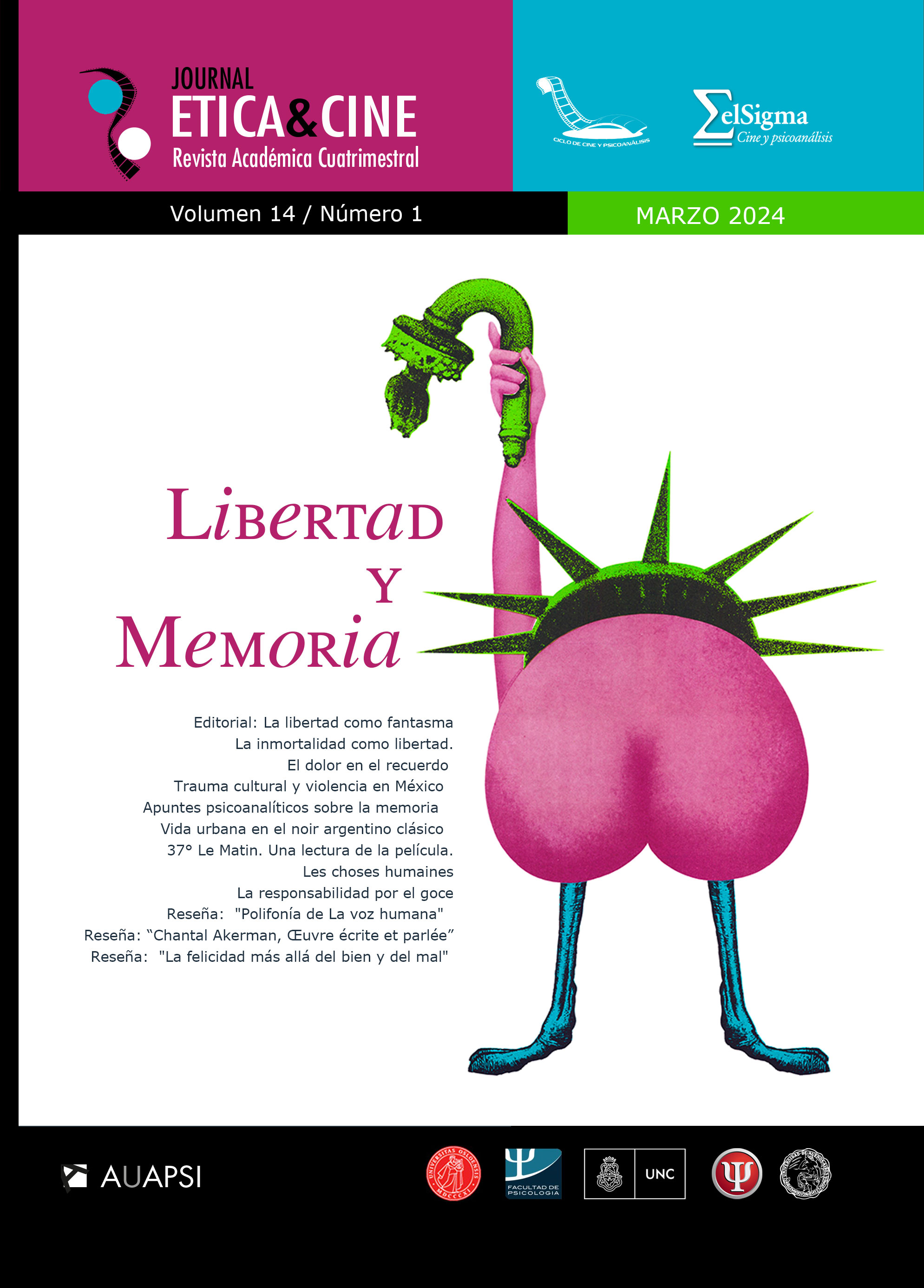Immortality as freedom. A cinematographic contrast
DOI:
https://doi.org/10.31056/2250.5415.v14.n1.44630Keywords:
freedom, Lars von Trier, Andréi Tarkovski, Kierkegaard, ethicsAbstract
This article seeks to contrast the libertarian ambitions of two great contemporary filmmakers -Andrei Tarkovsky and Lars von Trier- through a sample of their work, and taking into account the ethical resonances of their productions. Specifically, Tarkovsky’s film Offret/Sacrifice (1986) will be analised and, within it, the emphasis will be placed on the main character: Alexander; the same will be done with von Trier, but with the film The house that Jack built (2018) and the character called Jack. Beyond a mere cinematographic analysis, the article explores the richness or poverty of the inner world of the characters in both films and, albeit implicitly, shows their importance as models for clinical or public discussion on issues such as ethics or violence towards other people, our conceptual reading will mainly draw on the work of the philosopher Sören Kierkegaard and some counterpoints with the political theorist Hannah Arendt.
Downloads
References
Alighieri, D. (2013). La divina comedia. Alianza editorial. [publicado originalmente en 1321]
Arendt, H. (2002). La vida del espíritu. Paidós.
Arendt, H. (2003). La condición humana. Paidós.
Arendt, H. (2013). Eichmann in Jerusalem. A report on the banality of evil. Penguin Classics.
Arendt, H. (2018). ¿Qué es la filosofía de la existencia? Biblioteca Nueva.
Badley, L. (2010). Lars von Trier. University of Illinois Press.
Cavarero, A. (2000). Relating narratives. Storytelling and selfhood. Routledge.
del Palacio, J. (2017). Introducción. En Sören Kierkegaard, Diario de un seductor (pp. 9-29). Alianza editorial.
Kierkegaard, S. (1980). Sickness unto death. A Christian psychological exposition for upbuilding and awakening. Princeton University Press. [publicado originalmente en 1849]
Kierkegaard, S. (2009). La repetición. Un ensayo de psicología experimental. Alianza editorial. [publicado originalmente en 1843]
Kierkegaard, S. (2017a). Temor y temblor. Alianza editorial. [publicado originalmente en 1843]
Kierkegaard, S. (2017b). Diario de un seductor. Alianza editorial. [publicado originalmente en 1843]
Kierkegaard, S. (2019). El concepto de la angustia. Un mero análisis psicológico en la dirección del problema dogmático del pecado original. Alianza editorial. [publicado originalmente en 1844]
Merchán, V. S. (2017). Estudio preliminar. En Sören Kierkegaard, Temor y temblor (pp. 9-60). Alianza editorial.
Tarkovski, A. (director). (1986). Sacrificio [película]. Argos / Svenka Filminstitutet.
Tarkovski, A. (2006). Against interpretation: an interview with Andrei Tarkovsky. Ian Christie, 1981. En John Gianvito (ed.), Andrei Tarkovsky Interviews (pp. 63-69). University Press of Mississippi/Jackson.
von Trier, L. (director). (2009). El Anticristo [película]. Zentropa.
von Trier, L. (director). (2018). The house that Jack built [película]. Zentropa / Film i Väst.
Downloads
Published
How to Cite
Issue
Section
License
Copyright (c) 2024 Ética y Cine Journal

This work is licensed under a Creative Commons Attribution-ShareAlike 4.0 International License.
Los autores que publiquen en Ética y Cine Journal aceptan las siguientes condiciones:
Los autores/as conservan los derechos de autor © y permiten la publicación a Ética y Cine Journal, bajo licencia CC BY-SA / Reconocimiento - Reconocimiento-CompartirIgual 4.0 Internacional. La adopción de esta licencia permite copiar, redistribuir, comunicar públicamente la obra, reconociendo los créditos de la misma, y construir sobre el material publicado, debiendo otorgar el crédito apropiado a través de un enlace a la licencia e indicando si se realizaron cambios.

Este obra está bajo una licencia de Creative Commons Reconocimiento-CompartirIgual 4.0 Internacional.




